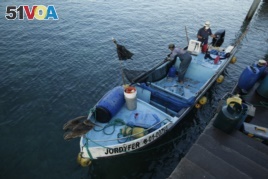19 May 2020
On the Galapagos Islands in the eastern Pacific Ocean, serious health problems are so rare that hospitals there were not equipped with intensive care areas.
Then, the new coronavirus arrived.
Now, officials are racing to equip medical teams on the distant islands with breathing machines called ventilators. But, they also are trying to deal with an economic crisis that has left many of the 30,000 islanders jobless.
The island group's famous isolation, which was so important to the theories of naturalist Charles Darwin, has increased its hardship.
For nearly two months, not a single tourist has visited the area. The Galapagos are considered a World Heritage site by UNESCO, the United Nations Educational, Scientific and Cultural Organization. Studies of the islands' ocean and bird wildlife have halted. People living there are making urgent changes, like growing carrots, peppers and tomatoes at home to increase the food supply.
"Galapagos is the land of evolution," said Joseline Cardoso, whose small family-run hotel on Santa Cruz island is empty. "The animals have adapted and we humans cannot be the exception."
 In this May 2, 2020 photo, fishermen work in their boat in the bay of San Cristobal, Galapagos Islands, Ecuador. Locals like to joke that, "In the Galapagos, it is prohibited to get sick." But COVID-19 has upended any sense of island immunity.
In this May 2, 2020 photo, fishermen work in their boat in the bay of San Cristobal, Galapagos Islands, Ecuador. Locals like to joke that, "In the Galapagos, it is prohibited to get sick." But COVID-19 has upended any sense of island immunity.The islands belong to Ecuador, which is among the Latin American nations hit hardest by COVID-19, the disease caused by the coronavirus.
Officials on the islands believe their first cases probably came from Guayaquil, the mainland port where hospitals turned away patients and the dead went unburied for days.
The Galapagos have been somewhat protected from what happens 1,000 kilometers away on the mainland. A financial crisis 20 years ago left many mainland Ecuadorians poor, but international tourism continued on the islands. Last year, over 275,000 people came to see the swimming iguanas, giant tortoises and sea birds with bright blue feet.
Many islanders go to the mainland to see doctors or pay to have doctors to fly in for major events like childbirth. Islanders also depend on military aircraft to carry seriously sick patients to Quito or Guayaquil.
Local people like to joke that, "In the Galapagos, it is prohibited to get sick." But the coronavirus changed everything.
The islands' first four cases were discovered in late March. All are believed to have come from Guayaquil before a travel ban was in place. Soon after, officials announced the first COVID-19 death linked to the islands: a worker in his 60s. He had been on a large boat called the Celebrity Flora and became sick after returning to Quito.
Now, there are more than 107 cases in the Galapagos. They include about 50 crew members still on the Celebrity Flora. The pleasure ship is operated by a part of Royal Caribbean Cruises. The passengers have left the ship and returned home.
Officials have hurried to equip hospitals. Currently, there are four intensive care beds – about one for every 7,500 residents – and one laboratory that can test for the virus.
Most of the COVID-19 patients on the islands have had minor cases of sickness. Only two people were admitted to the hospital.
The coronavirus' more damaging hit has been to tourism: Officials estimate the islands already have lost at least $50 million, one fourth of the expected yearly income.
"The base of our economy has entirely collapsed," said Norman Wray, governor of the islands. "This is completely changing the future of tourism in the Galapagos."
Ivan López, a guide and diving teacher, was at work sailing on a boat with tourists when Ecuador ordered everything closed. He got off the boat as ordered and was suddenly jobless. The 39-year-old father of two said he believes he can stretch his savings for six months. To help with food, he is growing a vegetable garden.
Prices of goods have increased sharply. A recent purchase of disinfectant cost him $40 for about four liters.
Joseline Cardoso dreamed up the idea of her six-room hotel when she was a student. She said the new reality feels like a nightmare. The hotel usually has a 75 percent occupation rate throughout the year, but travel to the Galapagos has been canceled through July.
"To be with an empty hotel breaks your heart," she said.
Ecuador's government has a three step plan to reopen the islands. But the plan does not include restarting national or international flights.
For many islanders, the coronavirus has left them to think about their relationships with nature, industry and travel. Some wonder if they should remain so dependent on tourism.
For Cardoso, the answer is in the story of the finches, penguins and tortoises, the animals that brought Darwin to the islands so many years ago.
"We have to put in practice the lesson of our history," she said. "We have to adapt."
I'm Mario Ritter, Jr.
Christine Armario and Adrian Vasquez reported this story for the Associated Press. Mario Ritter Jr. adapted it for VOA Learning English. Caty Weaver was the editor.
________________________________________________________________
Words in This Story
isolation –n. the state of being separated from others
tourist –n. a person who travels to a place for pleasure
evolution –n. the theory that the differences between modern plants and animals arise naturally from very small changes taking place of very long periods of time
adapt –v. to change to meet new conditions or changes in the environment
prohibit –v. to ban or bar
nightmare –v. a dream that frightens a sleeping person: a very bad dream